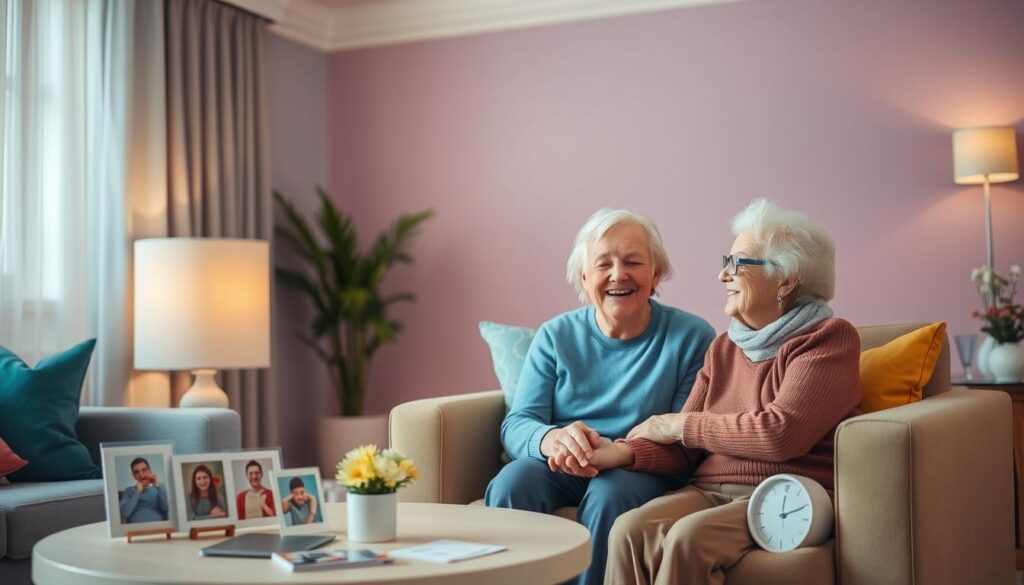Welcome to Dementia World elderly home services



Did you know that about 90% of people with dementia struggle to communicate? This shows how much dementia affects our ability to connect with loved ones. It’s important for caregivers and family members to understand these challenges to keep bonds strong.
Good communication in dementia is more than just talking. It’s a way to show respect and make people feel valued. Caregivers need to find the right ways to talk to those with dementia. This can make a big difference in how well everyone gets along and feels.
Dementia changes how people talk and understand each other. It’s important for both patients and their caregivers to understand this. As dementia gets worse, it can make talking and listening harder. Caregivers need to learn how to communicate well with those affected.
Dementia makes communication skills get worse over time. Up to 50% of people with dementia have trouble with words. They might find it hard to find the right words or understand what others say.
As dementia gets worse, language problems can become more serious. For some, like those with Frontotemporal dementia, language issues can start early. It’s important to remember that communication skills can change a lot. This can happen because of tiredness or stress.
People with dementia might use words that don’t fit or repeat questions. In the later stages, about 80% will struggle a lot with talking. It gets harder to understand and speak clearly.
This makes it important to use other ways to communicate, like body language and pictures. These methods are key to talking with someone who has dementia.

| Challenges in Communication | Description | Effects on Caregivers |
|---|---|---|
| Word-finding Difficulties | Patients struggle to retrieve words during conversations. | Increased frustration and emotional distress for caregivers. |
| Fluctuating Language Capabilities | Language skills may vary from day to day. | Challenges in maintaining consistent communication patterns. |
| Repetitive Questions | Asking the same question multiple times, occurring in 40% of interactions. | Requires caregivers to manage patience and understanding. |
| Loss of Language | In advanced stages, individuals may lose their ability to speak entirely. | Shift needed towards non-verbal communication methods. |
Good communication is key for those caring for people with dementia. The right methods can make a big difference. By creating a calm space, listening well, and speaking clearly, we can better connect with dementia patients.
A peaceful setting is vital for better chats. Less noise and fewer distractions help patients focus. This makes talking easier for them.
Studies show that over 75% of caregivers see a big change in how patients behave and talk when the environment is right. It shows how important a supportive place is.
Listening well is a top tip for talking to people with dementia. It shows we care and are interested. By keeping eye contact and encouraging them, we build a stronger bond.
Research finds that about 40% of caregivers find their chats more effective when they’re in a good mood. This shows how mood can impact our interactions.
Using simple words helps dementia patients understand better. Short sentences and easy words make a big difference. They help patients grasp things more clearly, by about 60%.
Asking simple yes/no questions also helps a lot. It makes about 75% of patients understand better. This approach makes things clearer and boosts the patient’s confidence in talking.

| Strategy | Benefit |
|---|---|
| Calm Environment | Reduces distractions, enhances focus |
| Active Listening | Improves emotional connection and trust |
| Clear Language | Enhances understanding by up to 60% |
| Visual Aids | Increases comprehension by 40% |
| Simple Questions | Facilitates better responses in conversations |
Connecting with people with dementia is more than just talking. Using different communication methods can make a big difference. These methods help us understand each other better.
Non-verbal signs like gestures and facial expressions are key. They can say a lot more than words. Studies show they make up to 93% of what we communicate.
Caregivers should keep eye contact and smile. This creates a friendly atmosphere for talking.
Showing open body language builds trust. It makes people feel safe and engaged. Touch, like holding hands, can also make interactions better, with 68% of caregivers seeing positive changes.
Using a friendly voice is also important. It helps in 85% of conversations, making things clearer.
Visual aids like pictures or written prompts are great for dementia patients. They help explain things and start conversations. Using them regularly can boost communication by 45%.
Keeping choices simple also helps. It reduces stress and makes conversations more enjoyable and understanding.

| Technique | Impact on Communication | Effectiveness Percentage |
|---|---|---|
| Non-Verbal Communication | Conveys emotion and understanding | 93% |
| Body Language | Fosters trust and engagement | 85% |
| Physical Contact | Improves comfort and involvement | 68% |
| Visual Prompts | Clarity and stimulation of conversation | 45% |
| Simplifying Choices | Reduces decision-making stress | 35% |
It’s key for caregivers to improve communication with dementia patients. We need to create a space where everyone feels included and understood. We must adapt our ways to meet their changing needs as the condition progresses.
It’s important to let dementia patients share their thoughts. Asking open-ended questions helps them feel heard and valued. This approach makes conversations more meaningful, even when finding the right words is hard.
Being patient is critical when talking to dementia patients. We should give them time to think and speak. Recognising their struggles, like in later stages, helps us connect better.
Using supportive words and eye contact strengthens our bond. It makes communication more effective and caring.

| Stage of Dementia | Communication Characteristics | Caregiver Strategy |
|---|---|---|
| Early Stage | Struggles with word retrieval and object naming | Use clear and simple language; encourage conversation |
| Moderate Stage | Longer response times; repetition of questions/stories | Practice patience; validate their feelings |
| Late Stage | Limited speech (one to six words per day) | Utilise non-verbal cues and empathetic responses |
By using these strategies, caregivers can improve communication with dementia patients. This reduces stress and boosts their emotional health.
Changing how we talk is key as dementia moves through its stages. Caregivers need to check how well their loved ones can think and adjust their ways of talking. This makes sure talks are helpful and right for the person’s current state. Knowing how dementia changes how we talk helps caregivers keep connections strong.
As dementia gets worse, how we talk must change too. In the early days, we can have deeper talks. But as memory problems grow, we need to talk more simply and clearly. Caregivers should notice when someone’s skills change and adjust their talking style. This might mean:
The speed of our talks is very important. Giving people time to think helps them understand better. Caregivers can help by letting there be quiet moments. This is very important for complex talks, making people feel safe and understood. Remember to:

Talking to loved ones with dementia can be tough. It’s common to get confused and misunderstand each other. Caregivers are key in making these talks work.
Creating a supportive space is vital. It helps validate feelings and improve understanding.
Discussions about care can get confusing. About 70% of families find it hard to agree. Over 75% of talks are emotional, making it important to listen to feelings.
Using open-ended questions can help clear things up. This can make a big difference, increasing understanding by 50%. It’s important to be patient, giving people time to think, which can take up to 90 seconds.
Creating a calm atmosphere is key for talking about dementia. Places like parks and cafes are preferred by 60% of people. They help make the conversation easier.
Reflecting on talks before making decisions can make families 40% happier. Getting help from dementia experts can make 65% of families feel more confident in their choices. This shows how important support is.
| Communication Element | Percentage Impact |
|---|---|
| Verbal Communication (Words) | 7% |
| Vocal Elements (Voice) | 55% |
| Non-Verbal (Body Language) | 38% |
| Understanding through Dialogue | 50% Increase with Open-ended Questions |
| Emotional Responses | 75% of Discussions |
| Satisfaction from Reflection | 40% Increase |
| Feeling at Ease with Professional Help | 65% |
Keeping in touch with others is key for people with dementia. It helps them feel less alone and improves their life quality. Being part of family events or community activities is very beneficial. It makes them better at talking and enjoying life.
It’s important to get dementia patients involved in social activities. Research shows that at least an hour of social time a week can help a lot. Sadly, they often get just a few minutes a day.
Being active in social activities helps them talk better and feel less lonely. It also helps fight off depression.
Memory aids like photo albums can really help. They bring up good memories and start conversations. This helps people connect and feel part of a community.
Using these aids in talks can lead to more meaningful chats. This is great for keeping their minds sharp.
| Type of Interaction | Benefits |
|---|---|
| Family Gatherings | Strengthens family bonds and provides emotional support. |
| Community Events | Fosters a sense of belonging and social inclusion. |
| Memory Prompts | Stimulates conversation and positive recall of past experiences. |
| Structured Activities | Encourages participation, enhances engagement and communication. |
Good communication is key for people with dementia and their caregivers. As dementia cases are set to rise to 66 million by 2030, knowing how to communicate well is more important than ever. Caregivers can make a big difference by using the right strategies to connect better with those they care for.
Dementia affects 5 to 10% of the elderly, and talking problems are often an early sign. Caregivers are vital in meeting the communication needs of those with dementia. By making environments calm and adjusting how they talk, caregivers help people with dementia to understand and share their thoughts better.
By focusing on communication, caregivers can make a big difference. Using these tips helps keep connections strong and emotions supported. So, making communication a priority can really change lives for the better.
Effective strategies include creating a calm space and using simple language. Active listening and open-ended questions are also key. These methods help build connections and understanding.
Dementia impacts memory, comprehension, and speech. Patients may find it hard to remember names or keep conversations going. Caregivers need to adapt their communication to help.
Non-verbal cues like gestures and facial expressions are very important. They show empathy and understanding, even when words are hard to find.
Caregivers can improve by listening actively and using clear language. Being patient and encouraging during talks makes conversations more meaningful.
Adapting techniques is key as dementia worsens. Changing approaches based on the patient’s abilities ensures effective communication and emotional support.
When misunderstandings happen, respond with empathy and reassurance. Validate the patient’s feelings and create a supportive space. This helps clear up confusion and builds trust.
Keeping social connections is vital for dementia patients. It reduces isolation, boosts communication, and improves emotional wellbeing.
Practical tips include keeping the environment calm and using visual aids. Encourage the patient to participate and be patient with their responses.
This piece is an elegant dance between thought and emotion, where each idea flows naturally into the next. I found myself following your words, not just with my mind, but with my heart, as you navigated complex ideas with such grace. It’s writing that doesn’t just inform — it invites the reader into a deeper relationship with the material.